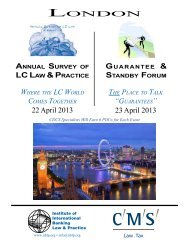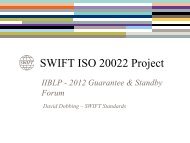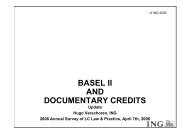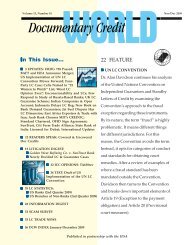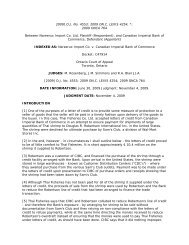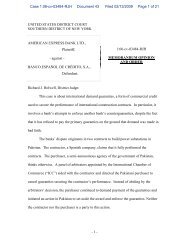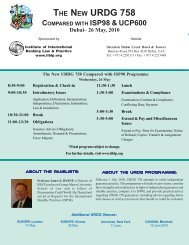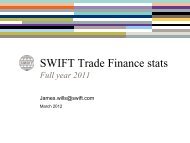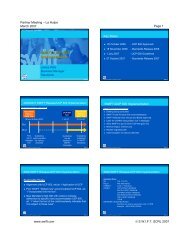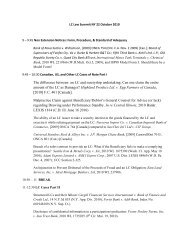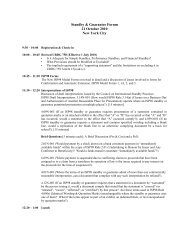FEATURE - The Institute of International Banking Law & Practice
FEATURE - The Institute of International Banking Law & Practice
FEATURE - The Institute of International Banking Law & Practice
You also want an ePaper? Increase the reach of your titles
YUMPU automatically turns print PDFs into web optimized ePapers that Google loves.
<strong>FEATURE</strong><br />
transaction because <strong>of</strong> the<br />
requirements.<br />
Prior to completing the LC<br />
cases discussion, panelists<br />
reported that Mexico adopted<br />
legislation on 1 February 2008<br />
regarding letters <strong>of</strong> credit (see<br />
Apr 2008 DCW 9). Panelists<br />
called upon Americas Annual<br />
Survey delegates from Mexico<br />
for further details. One <strong>of</strong> the<br />
bankers from Mexico<br />
explained that, previously,<br />
banks were not authorized to<br />
issue standby letters <strong>of</strong> credit<br />
without the permission <strong>of</strong> the<br />
central bank. This legislation<br />
now empowers banks to issue<br />
standbys. Panelists believe this<br />
will likely open the door for<br />
Mexico to seek more LCs<br />
(instead <strong>of</strong> bonds) for<br />
government-related business.<br />
Open Forum<br />
As with each Annual Survey,<br />
the 2008 Americas conference<br />
closed with an opportunity for<br />
delegates to pose questions to<br />
panel members and fellow<br />
delegates. <strong>The</strong> session began<br />
with one corporate LC user<br />
asking for an interpretation <strong>of</strong><br />
what “irrevocable” means and<br />
to whom “irrevocability”<br />
applies. In some instances,<br />
trading partners want<br />
applicant-controlled<br />
documents and some banks<br />
are saying that this affects the<br />
irrevocability. One panelist<br />
stated that banks don’t want<br />
to be put in a position<br />
whereby an applicant might<br />
withhold signing a document.<br />
Referencing ISP98 Rule 4.10,<br />
the panelist explained that a<br />
standby should not allow<br />
applicant-controlled<br />
documents, but if such<br />
document is required by the<br />
credit, the issuer cannot waive<br />
this requirement.<br />
<strong>The</strong> worry, another panelist<br />
noted, is that this would create<br />
an “unfair” surprise that is<br />
undesirable. <strong>The</strong> LC<br />
community should want to<br />
protect the reputation <strong>of</strong> the<br />
LC instrument. Another<br />
participant added that if the<br />
applicant wants a provision in<br />
the LC that allows the issuing<br />
bank to cancel if the applicant<br />
presents something proving it<br />
has completed its part <strong>of</strong> the<br />
contract, then that would be a<br />
revocable credit.<br />
Regarding communication<br />
between bank and applicant,<br />
one delegate asked if a bank<br />
would be “inviting trouble” if<br />
it would advise an applicant<br />
that the applicant can only stop<br />
the bank from paying by<br />
getting an injunction. Could<br />
the bank be accused <strong>of</strong><br />
collusion Some panelists<br />
opined that they would not be<br />
concerned about a collusion<br />
allegation, but they urged<br />
banks not to “advise” the<br />
applicant. Instead, the bank<br />
might reference US Revised<br />
UCC Article 5-109 (which<br />
contains the law that would<br />
govern the situation) and<br />
mention the applicant might<br />
consult a lawyer. Also, banks<br />
should not give a time<br />
deadline for the applicant to<br />
reply. Delegates explained this<br />
scenario is a real concern to<br />
them, but panelists reiterated<br />
their belief that a deadline<br />
should not be given and stated<br />
that a bank should not change<br />
its procedures on document<br />
examination over this matter.<br />
A participant asked about<br />
an applicant certificate for an<br />
automatic decrease especially<br />
where there is a counter<br />
guarantee. One panelist stated<br />
that the standby is in one<br />
direction and commercial is in<br />
the other direction, so this is<br />
determinable from the bank’s<br />
own records when payment is<br />
made and the bank can reduce.<br />
He cautioned, however, that<br />
this must be tightly controlled.<br />
Another participant asked<br />
about a local guarantee which<br />
contained language stating<br />
that it was freely assignable<br />
and transferable without<br />
notice to the issuing bank.<br />
How could one make sure that<br />
the letter <strong>of</strong> credit is not<br />
transferred or assigned to a<br />
prohibited party One<br />
delegate suggested that within<br />
the language <strong>of</strong> the draw <strong>of</strong><br />
the counter standby, the local<br />
bank must certify who was<br />
drawing under their local<br />
guarantee. Panelists noted that<br />
in some instances, applicants<br />
do not do their homework and<br />
submit formats that local<br />
banks cannot issue. ■<br />
24 Documentary Credit World ■ June 2008



